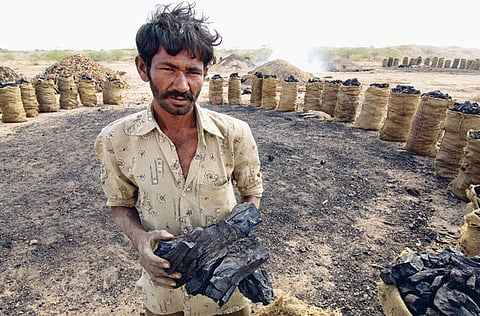Energy crisis forces Bangladesh to consider open pit mining
Consideration would maximise extraction but entail relocating local population

Dhaka: Energy-starved Bangladesh plans to adopt controversial open pit mining at a major northwestern coal mine to maximise extraction despite controversies over the method, environmental damage and the displacement of thousands, officials and reports said.
The Daily Star newspaper quoting officials familiar with the situation reported that Prime Minister Shaikh Hasina told officials that the Barapukuria coal mine might be converted into the country's first open pit mine after rehabilitating the local people affected by the present underground mining activities.
"The prime minister mentioned that the land in the Barapukuria mining area is already damaged and has subsided [and] after paying compensation to people for the loss of land and rehabilitating them, the mine could be converted into an open pit mine," the report said, quoting a meeting source as Hasina joined a high-level meeting to review the energy and power crisis.
She, however, noted that while many countries could easily implement open pit mining to extract up to 90 per cent of their coal deposits, a densely populated agricultural-based country like Bangladesh could not opt for such a mining method so easily and asked officials to explore ways to minimise environmental damage.
"The premier and officials present at the meeting had the same view on the coal mining method," the report said.
Experts also said underground mining was not environmentally-friendly because the surface land subsides by one to two metres, making it useless for farming.
Experts say underground mining allows extraction of up to 20 per cent of deposits while the volume could be over 80 per cent if the open pit or surface mining method is followed.
Officials said Barapukuria mine has a deposit of 389 million tonnes of coal but the present underground mining being carried out by a Chinese company would allow extraction of only 30 million tonnes over 30 years, and leave a four and a half square kilometre area with at least one to two metres caved in and of no use.
She felt that at first people had to be compensated for loss of their land, and then they could realise that a bigger mine had greater benefit for the whole nation.
Soon after assuming power, the ruling Awami League government started working on a compensation package for the Barapukuria coal mine site alongside designing a mining city in the area where the affected people will be offered jobs and residential facilities.
Surveys by the Geological Survey of Bangladesh (GSB) and others so far pinpointed five coal deposits having more than 2,500 million tonnes reserve, which is equivalent to more than 60 trillion cubic feet of gas.
There is also untapped coal resource potential in the northern region of the country and the biggest of these deposits in Jamalganj is so deep that it cannot be profitably mined with existing technology.
Bangladesh needs 13 million tonnes of coal a year for the next 10 years to generate additional power to meet its rising demand, as natural gas supplies for generating power will not meet this need.
According to the sixth draft coal policy, if Bangladesh's gross domestic product (GDP) growth remains as low as 5.5 per cent until 2025, the country will need 19,000 megawatts of additional power.
If GDP growth is as high as eight per cent, it will need 41,000 megawatts.
But the country is already facing an acute gas crisis, a situation when coal is being considered as an alternative.
According to a government study in a low GDP growth situation, Bangladesh will need 136 million tonnes of coal, and in case of high GDP growth, it will need 450 million tonnes of coal until 2025.
Officials mentioned the government has already taken initiatives for six 500 megawatts of coal-based power plants in Chittagong, Mongla, Jajira and Meghnaghat to be operated with imported coal.



